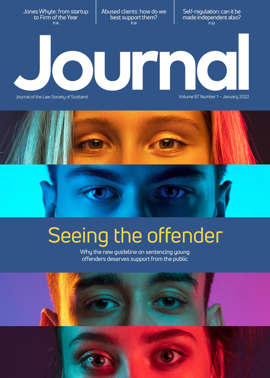QES: the who and how

Over recent years, the use of electronic signatures has become increasingly common in a range of commercial transactions and contracts, and the pandemic only served to speed up wider adoption.
As this trend is expected to continue, it is important to be aware of the different options available and the legal requirements for different types of documents.
The Society’s Electronic Signatures Working Group published a guide to electronic signatures in 2020 which outlines the different types of signatures and their validity as well as the signing and verification process. The guide can be found in the business support section of the Society’s website.
In addition to this guide, the Society has recently been looking specifically at the use of qualified electronic signatures (QES).
A QES is the most secure type of signature as it involves the signatory’s identity being verified by a qualified trust service provider before the signatory is issued with a QES. Under Scots law, a QES is the only type of electronic signature that is self-proving (probative). It is used for:
- missives and other documents dealing with the transfer of rights in land;
- certain types of guarantees; and
- where (under Scots law) you wish a document to have self-proving status.
Many in the profession will already be familiar with a QES as it is a fundamental benefit in your Law Society of Scotland smartcard. In some countries (including some in continental Europe with civil law systems), QESs are more widely available. For example, some countries have them built into national identity cards.
Qualified electronic signatures are by their secure nature more complex than other types of signatures and, along with higher costs, this has been seen as a barrier to adoption for some firms. However, there are now many providers who offer affordable cloud-based QES solutions that integrate easily to existing legal processes. It can be challenging to decide which QES provider to choose, so the Society has created a panel of providers (see logos) to help solicitors find a suitable solution for their needs by comparing benefits and costs. This panel is expected to grow, as it only represents a small selection of the market at present, but it is important to be able to compare what is on offer.
More details of the panel can be found on the Society’s website.

Notifications
ENTRANCE CERTIFICATES ISSUED DURING november/december 2021
ANDERSON, Samantha
ASLAM, Amina
CARMICHAEL, David W A
FINNON, Peter Joseph
HIRAN, Jasmine Gilraj
HOURSTON, Thomas
LAL, Priya Javed
MACDONALD, Jonathan Magnus
McKEOWN, Tim Robert
McMILLAN, James David
MOHAMMED, Jena Karen
MORRISON, Samantha Ria
OPALA, Morgen
PANOL, Suzanne
QUINN, Gillian
RATHBONE, Hilary McPhail
SCOTT, Gillian Catherine Anne
APPLICATIONS FOR ADMISSION
November/december 2021
BORTHWICK, Alison Elizabeth
CHANEVA, Lili Teodorova
DAVIDSON-RICHARDS, Oliver
DORMER, Deborah
DORRIAN, Robert Lindsay
DUFF, Megan Louise
FAULDS, Lewis David
HAIR, Charlotte Anna Marion
JOHNSTONE, Kate Anne
KEENAN, Julianna Frances
KOCELA, Anna Maria
LIGHT, Luke Evan
McALLISTER, Lindsay Regan
McALLISTER, Megan
McALONAN, Danielle Josephine
McALPINE, Anna Megan
MACDONALD, Andrew Lewis
MACDONALD, Sarah Louise
McFADYEN, Emily
McFARLANE, Lucie Maria
McGOWAN, Sarah Emily
McGRATH, Kieran Sean
McKITRICK, Michael Thomas
McNALLY, Sophie Marie
MACPHERSON, Katherine Rhona Morrison
MALLEY, Sophie
MALTMAN, Heather
MOUAT, Anna Lai-Ming
NOBLE, Jennifer Ann
PEOPLES, Ruari Daniel
PHILIP-DAVIDSON, Sophie
REYNOLDS, Caroline Elaine
ROBERTSON, Andrew Francis
SCOTT, Erin Atlanta
SHANNON, Nicholas Gregory
SHERIDAN, David Myles
SKINNER, Celine Page
SLOAN, April






